


|
Joined:
|
26/05/2015 |
|---|---|
|
Last Updated:
|
09/01/2016 |
|
Location:
|
Phoenixville, PA, United States |
|
Climate Zone:
|
Cool Temperate |
|
Gender:
|
Male |
|
Web site:
|
www.permscape.com/ |
(projects i'm involved in)
(projects i'm following)
Back to John Stevenson's profile
Posted by John Stevenson over 8 years ago
Duckweed – Used as a floating cover crop providing shelter for the Tilapia fry, as a water cleaner, soil amendment, and free fish/livestock/worm/etc. feed.
Our newborn Tilapia fry live in food grade tubs. They feed on dried Algae at this early stage but will eventually be trained to eat pellets, worms, berries, bugs, and plants.
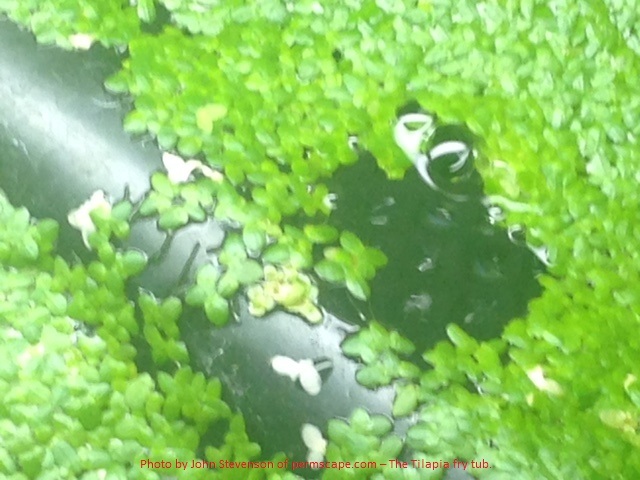
The fish excrete ammonia, which is toxic to them in high concentrations. The Duckweed does an acceptable job of cleaning the water for the fish. Little maintenance of the fry tanks is necessary. The tanks are cleaned about once a month and the duckweed is removed during the cleaning process where it is set aside to dry.
Once it is dried it is fed to the larger fish in our separate Aquaculture and Aquaponics systems.
Dried duckweed is about 35%-40% protein. We are experimenting with dried duckweed as one of the many ingredients of a sustainable, balanced, all natural, and organically grown, pellet tilapia food.
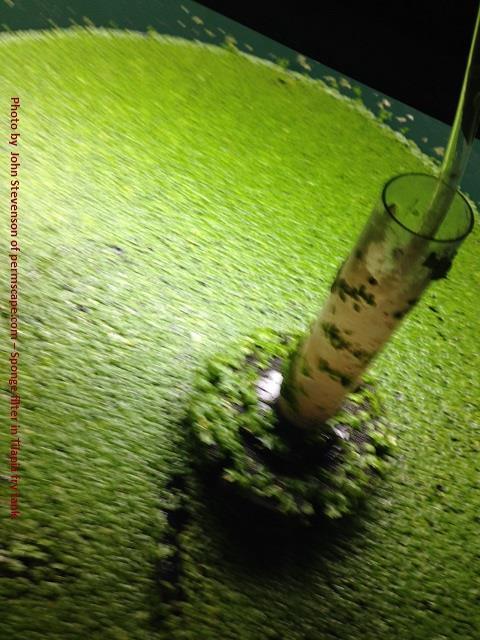
The tub used to raise the Tilapia fry to fingerlings is oxygenated by a single sponge filter below the surface.
The air leaves the top of the filter through an upside-down plant container. This reduces surface disturbance and allows the duckweed to thrive.
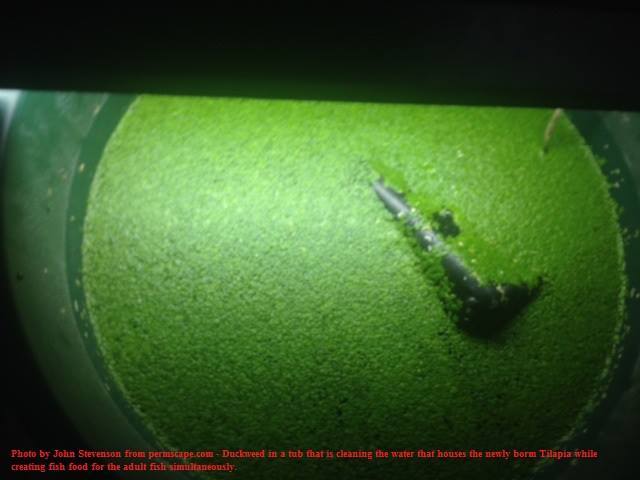
A little duckweed will remain on the tank sides after cleaning, water testing, and any water change or top-up that may be necessary. All water removed from the system is used in our food forest nursery as a fertilizer.
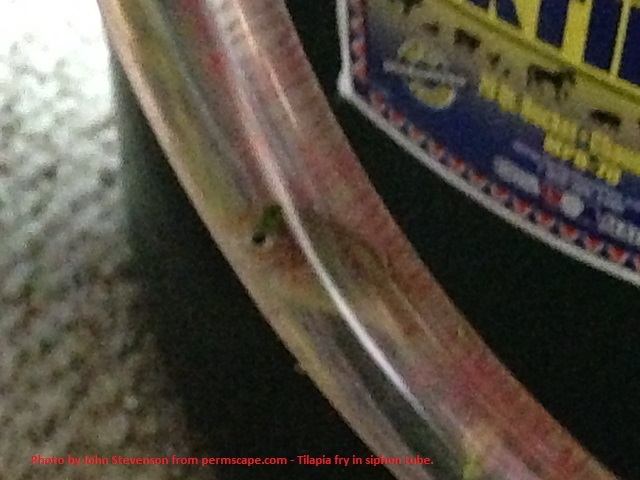
The tanks are cleaned with a clear siphon hose. The fry pictured above swam into it. I use a clear hose so I can observe any fry caught in the suction. I break the flow so they are released and can travel safely back into the tank.
The small amount of duckweed that is left behind in the tub will regrow into a dense mat once again. It will keep pace with the fry as they grow. In nature Duckweed is a common cover for fry and it works equally well in the tubs.
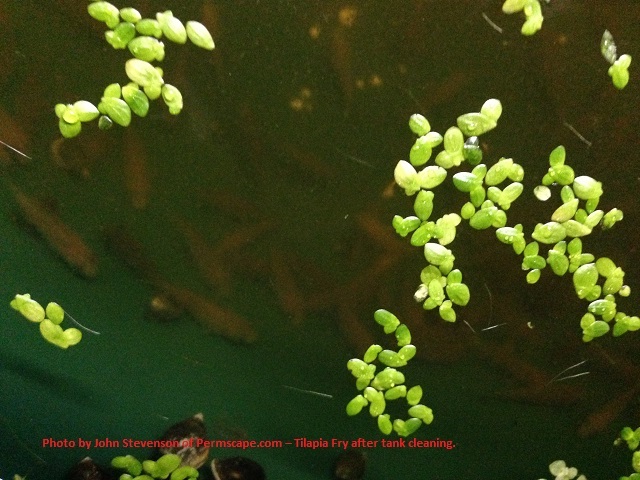
In Pennsylvania, you can find duckweed ponds using google earth. Large green patches are fairly obvious in ponds, lakes, and rivers across the state. They can be readily identified. Most farmers will allow you to harvest some duckweed, if you ask, from their ponds.
Duckweed is useful to add to compost, use as a soil amendment, and we also use it as a mulch in our soil gardens.
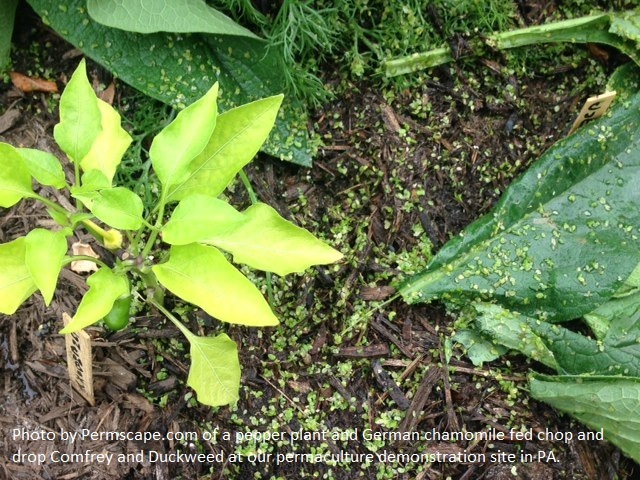
Occasionally we harvest some duckweed to add to the diversify of the diets of our composting worms, black soldier flies, and livestock.
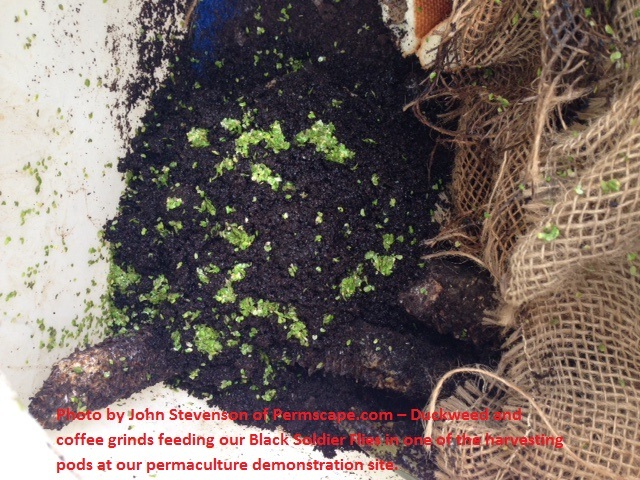
Duckweed has many uses. We feed duckweed and coffee grinds to our Black Soldier Flies in one of the harvesting pods at our permaculture demonstration site (see above). Once mature, the larvae are then pasteurized in a sun oven and fed to our fish.
Bonaparte believed an army marches on its stomach. Our armies of composting worms have full stomachs and a diversified diet (Eisenia fetida). They are grown in several totes. They are feed settled fish waste from the aquaponics/aquaculture systems, veggie scraps, comfrey, scrap shredded paper, coffee grinds, cardboard, and duckweed.
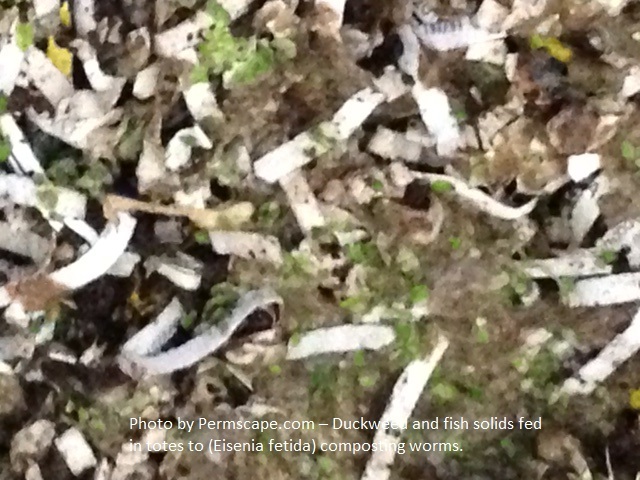
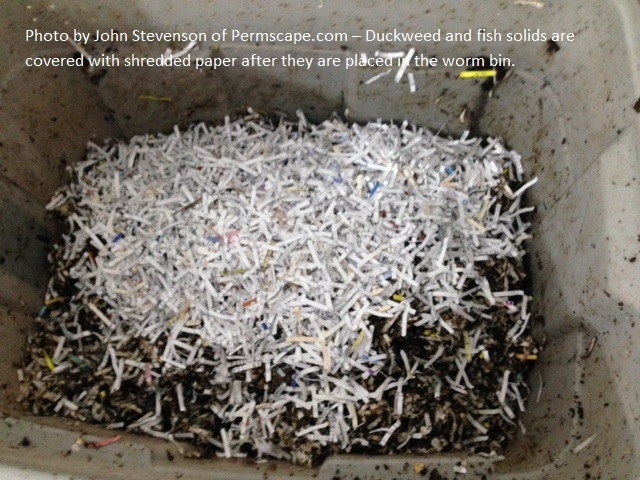
A duckweed floating cover crop seems to minimize evaporation. Tubs of duckweed appear to require less topping up when compared against similar tubs with no floating cover crop.
The below link is to a free resource worth reading:
DUCKWEED: A tiny aquatic plant with enormous potential for agriculture and environment
http://www.fao.org/ag/againfo/resources/documents/DW/Dw2.htm
You must be logged in to comment.

| Permaculture Design Course 2015 |
| Type: Permaculture Design Certificate (PDC) course |
| Verifying teacher: Salah Hammad |
| Other Teachers: Geoff Lawton |
| Location: On-Line |
| Date: Feb 2015 |

| Geoff Lawton |
| Type: Geoff Lawton Online PDC |
| Teacher: Geoff Lawton |
| Location: Online |
| Date: Feb 2015 |

| Geoff Lawton |
| Type: Geoff Lawton Online Earthworks |
| Teacher: Geoff Lawton |
| Location: Online |
| Date: Feb 2015 |

| Geoff Lawton |
| Type: Geoff Lawton Reading the Landscape |
| Teacher: Geoff Lawton |
| Location: Online |
| Date: Feb 2015 |
| 2 PDC Graduates (list) |
| 0 PRI PDC Graduates (list) |
| 0 Other Course Graduates (list) |
| have acknowledged being taught by John Stevenson |
| 0 have not yet been verified (list) |
| John Stevenson has permaculture experience in: |
|---|
| Cold Temperate |
| Cool Temperate |